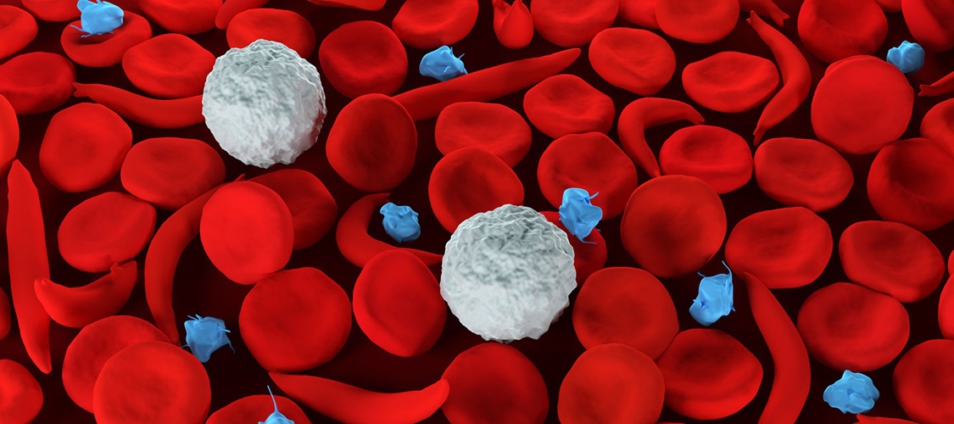For farmers, the rainy season presents itself as an ideal time of happiness because their crops are going to be naturally watered. Others think it's a nice time to hug and stay warm. It's the finest time for a good night's sleep. While many people find this period to be refreshing, a small percentage of people find it to be hellish. During this time, those with sickle cell illness go through hell. The sickle cell issue is this week's topic.
What is a sickle cell crisis?
Sickle cell crisis is a sudden unpleasant event (painful) in the life of people with sickle cell disease that can last anywhere from a few hours to several days. Crisis, which might include chest discomfort, abdominal pain, joint aches, pain in the fingers, back pain, priapism in men, and other symptoms, do not occur spontaneously. Triggers exist. Cold weather, infections, dehydration, and blood oxygen tension are among the triggers (hypoxia). We're in the midst of the cold wet season, which means that crisis rates are at an all-time high. Let's look at what parents, schools, and patients may do to avoid these situations.
Parents
Children often have crises at school during this season because of the cold. The weather is subject to rapid shifts. The weather may be clear when you send your child to school, but it could change in a few hours after you drop them off. I strongly advise parents to provide jackets to their children regardless of the weather when they leave for school or any other function during this time.
The lifespan of typical red blood cells (RBCs) is 90-120 days. Patients with sickle cell disease are more likely to be anaemic because they break down red blood cells (RBCs) more quickly than the normal 90-120 days. Foods such as kontonmire, cabbage, lettuce, and other green leafy vegetables, as well as beans, lentils, and potatoes, are high in folate and iron, which is needed to replenish lost RBCs and avoid anaemia.
It is common knowledge that the rainy season brings increased mosquito breeding grounds. Malaria is a parasite ailment spread by mosquitoes. Sickle cell crisis is known to be triggered by infection of which malaria is no exception. Despite the fact that sickle cell disease has an inbuilt protection mechanism against malaria, sickle cell patients are more likely to get severe forms of malaria.
I implore parents to ensure that their children sleep under insecticide-treated nets and that residual spraying is done on a regular basis during these times. This is a good strategy to avoid a crisis.
Parents should make sure that hydroxyurea and folate, which are prescribed at the sickle cell clinic, are taken on a regular basis. Patients should be on the alert for the symptoms listed in paragraph 2 as early warning signs of a crisis.
Teachers
There have been numerous instances where students with sickle cell disease have experienced difficulties in school. I would like to implore teachers and administrators of various institutions to pay special attention to sickle cell disease children.
They should recall and insist that these distinguished folks be well-dressed and covered throughout this time with jackets and socks. During breaks, strenuous games should be checked, and there should be a robust and dependable support system in place for them.
Teachers should be on the watch for the symptoms listed in paragraph 2 so that they can assist these children and call for medical attention at the nearest health facility.
Individuals living with sickle cell must visit regularly the sickle cell clinic. Take the drug regimen given to them seriously. Stay hydrated with 6-8 sachets of water daily. Eat well and have restful sleep. Lack of sleep can trigger a crisis so please attend carefully to these.
The support system of sickle cell patients should be strengthened. I want to plead with non-sickling ones to be more caring towards these individuals because they go through a lot these times.
*****
The writer is a final year medical student at the University of Development Studies and can be reached at (@_papabiney on Twitter & Instagram) and mikebiney77@gmail.com
Latest Stories
-
Situate power sector challenges within the context of the 4th Republic – Jantuah
13 mins -
Empowering Youth through IT Education: IT For Youth Ghana College leads the way
20 mins -
Trump criminal case: Full 12-person jury seated in Manhattan
33 mins -
Israel Gaza: US again warns against Rafah offensive
36 mins -
Man arrested in Poland over alleged Russia plot to kill Zelensky
40 mins -
Over 100 arrested as US college Gaza protest cleared
43 mins -
Justmoh Construction begins work on dualization of Takoradi-Agona Nkwanta road
55 mins -
MGL visits Dumor family following passing of Mawuena Trebarh
1 hour -
In Pursuit of Peace and Unity: Interfaith Leaders Promote Dialogue – Chief Doli-Wura to Africa Union
1 hour -
TEWU raises concern over quality of food served in SHS
2 hours -
Ghanaian students gear up for Robotics World Championship
3 hours -
Political interference makes public sector managers appear incompetent – Dr Manteaw
3 hours -
Police arrest truck driver alleged to have caused train crash
3 hours -
CAF Confederation Cup: Dreams FC depart to Cairo ahead of semis first leg against Zamalek
3 hours -
Liverpool exit Europa League despite 1-0 win over Atalanta
3 hours

